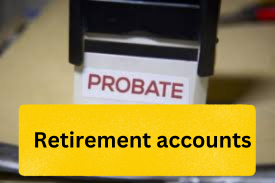When planning for the distribution of assets after one’s passing, the issue of probate often looms large. Probate can be a lengthy and costly process, tying up assets and causing unnecessary stress for loved ones. However, there is one type of asset that typically avoids the probate process altogether: retirement accounts. In this article, we delve into the intricacies of probate and retirement accounts, shedding light on why and how these accounts are exempt from probate in most cases. We’ll also explore the situations where retirement accounts might still find themselves subject to probate and provide practical steps to ensure they bypass this legal process smoothly. Let’s uncover the truth about retirement accounts and probate.
Retirement accounts, such as IRAs and 401(k)s, typically bypass probate because they operate under a designated beneficiary structure. When you open these accounts, you have the option to name beneficiaries who will receive the assets upon your death. Because of this designation, the assets in the account transfer directly to the named beneficiaries, circumventing the probate process.
Situations Where Retirement Accounts Might Go Through Probate
While retirement accounts are designed to avoid probate, there are scenarios where they may still end up going through the process:
No Designated Beneficiary
If you fail to name a beneficiary or if the named beneficiary predeceases you, the account may have to pass through probate.
Estate Named as Beneficiary
Designating your estate as the beneficiary of your retirement account can result in probate. It’s generally advisable to avoid this practice as it can lead to delays and additional costs.
Minor Children as Beneficiaries
If you name minor children as beneficiaries, the court may need to appoint a custodian to manage the funds until the children reach the legal age.
Ensuring Retirement Accounts Avoid Probate
To ensure your retirement accounts bypass probate, follow these steps:
Keep Beneficiary Designations Up-to-Date
Regularly review and update beneficiary designations on your retirement accounts to reflect any changes in circumstances, such as births, deaths, marriages, or divorces.
Consult with an Estate Planning Professional
Seek guidance from an estate planning professional to ensure your beneficiary designations align with your overall estate plan and goals.
Conclusion
Retirement accounts like IRAs and 401(k)s offer a convenient way to transfer assets to beneficiaries outside of the probate process. By properly designating beneficiaries and keeping beneficiary information current, you can ensure a smooth transfer of assets to your loved ones upon your passing, avoiding the complexities of probate. Be proactive in managing your retirement accounts to protect your assets and provide for your beneficiaries according to your wishes.
